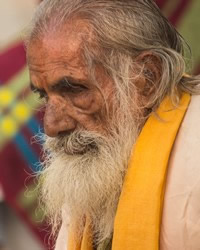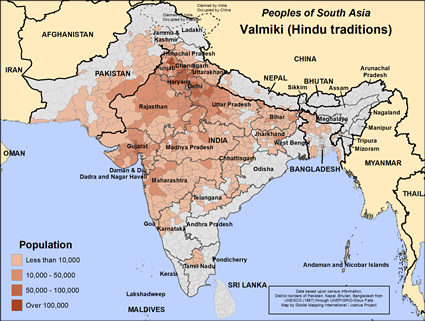Valmiki (Hindu traditions) in Pakistan

Photo Source:
Copyrighted © 2026
Aathi94 - Shutterstock All rights reserved. Used with permission |

Map Source:
People Group data: Omid. Map geography: UNESCO / GMI. Map Design: Joshua Project
|
| People Name: | Valmiki (Hindu traditions) |
| Country: | Pakistan |
| 10/40 Window: | Yes |
| Population: | 122,000 |
| World Population: | 5,078,900 |
| Primary Language: | Saraiki |
| Primary Religion: | Hinduism |
| Christian Adherents: | 0.05 % |
| Evangelicals: | 0.05 % |
| Scripture: | New Testament |
| Ministry Resources: | Yes |
| Jesus Film: | Yes |
| Audio Recordings: | Yes |
| People Cluster: | South Asia Tribal - other |
| Affinity Bloc: | South Asian Peoples |
| Progress Level: |
|
Introduction / History
All Valmiki claim to be descendants of Valmiki, an author of the Ramayana. Some of the Valmiki living in the Punjab have converted to Sikhism. Some Valmiki became Muslims during the Mogul Period.
In colonial times, the Valmiki were known as a martial (military) caste. Many of them found employment in the British Army. Today Valmiki continue to serve in the Pakistani Armed Forces.
The primary languages of the Valmiki of Pakistan are Saraiki, Western Punjabi and Sindhi. There are few in any believers among the Valmiki in either India or Pakistan.
The vast majority of the Hindu Valmiki people live in India. Much smaller populations live in Pakistan, Nepal and Bangladesh.
What Are Their Lives Like?
In India and Pakistan most Valmiki occupy a lower place in society. Besides serving in the military, Valmiki labor as streetsweepers, watchmen, toilet cleaners, and as farm workers. The Valmiki generally do not own the land they work on. Some Valmiki have become educated and work in politics, teaching and government positions.
The Valmiki tend to marry within their group. Families arrange marriages with the consent of the young couple. Girls marry in their teens while boys are a few years older. Marriage to one spouse is the norm among the Valmiki. Boys receive at least an elementary education while girls often quit school after a few years to help their mother with domestic responsibilities.
Rural Valmiki often lack access to modern medicine, so their life expectancy is less than 60 years. Valmiki parents have many children. Unfortunately, many children die before reaching the age of ten. Their main foods are rice, vegetable and lentils. Hindu Valmiki eat meat except for beef. They also refrain from eating pork as to not offend their Muslim neighbors.
What Are Their Beliefs?
The Valmiki people practice Hinduism, the ancient religion of India. Hinduism is a catch-all phrase for the local religions of South Asia, so it is very diverse. At the popular level, Hindus worship and serve the gods of the Hindu pantheon. They visit Hindu temples and offer prayers, food, flowers, and incense to their gods in hopes of gaining protection and benefits. They do not have a personal or familial relationship with their gods as Christians do. There are other Hindus who are much more philosophical, especially among the Brahmins.
Almost all Hindus participate in yearly celebrations like Holi, the festival of colors and the start of spring / Diwali, the festival of lights / Navratri, the celebration of autumn / and Rama Navami, Rama's birthday.
What Are Their Needs?
The Valmiki need new job skills so they can improve their place in society. Valmiki women need to improve their literacy levels. Rural Valmiki would benefit by having access to modern medicine. Most of all, Valmiki must hear and respond to the good news about Jesus Christ. He alone can forgive their sins and grant them eternal life.
Prayer Points
Ask the Lord to send anointed workers to the Valmiki of Pakistan and India.
Pray that the leaders among the Valmiki would be open to hearing the gospel.
Pray that the Valmiki would be led by the Holy Spirit to listen to Christian radio programs.
Pray for a movement to Christ among the Valmiki this decade.